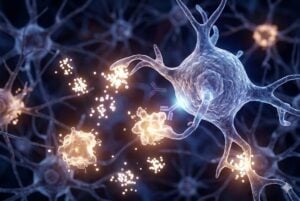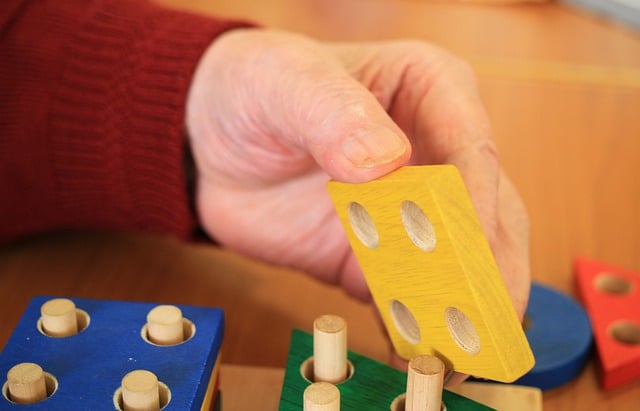Although the progression of Alzheimer’s disease can be slowed down today thanks to today’s medications, it cannot as of yet be stopped. The process is described in general terms as going through 3 steps:
- Mild Alzheimer’s
- Moderate Alzheimer’s
- Severe Alzheimer’s.
For more meaningful terms between professionals, caregivers and patients, a more detailed process has been characterized in seven stages.
The seven stages below are based on a system developed by Barry Reisberg, M.D., clinical director of the New York University School of Medicine’s Silberstein Aging and Dementia Research Center.
Stage 1 – Normal
This system calls a mentally healthy person at any age “Stage 1”.
- No memory problems
- No problems with orientation
- person – your name, who you are;
- place – what country, state, city you live in, where you are;
- time – what day, date, season it is
- No problems with judgment
- No difficulties with communication skills
- No problems with daily activities
Stage 2 – Normal Aged Forgetfulness
Free subscription to Alzheimer’s & Dementia Weekly. Click here.
More than half of all people ages 65 and older complain of cognitive difficulties. This is considered a normal part of aging.
- Occasional lapses in memory, usually undetectable to family and friends
- Slight cognitive problems, also undetectable to friends and family, might also not be visible on medical exam
Stage 3 – Mild Cognitive Impairment
At this point, there are mild changes in memory, communication skills and/or behavior, noticeable to family members and friends. Symptoms might be picked up by an alert physician. Many people will not decline further than this point. Notwithstanding, a majority do progress to Mild Alzheimer’s within two to four years.
- Problems remembering names, words for objects
- Difficulties functioning at work and in social settings
- Problems remembering newly-read material
- Misplacing important items with increasing frequency
- Decline in organizational skills and the ability to plan
- Repeating questions and evident anxiety
Stage 4 – Mild Alzheimer’s
Cognitive symptoms are more obvious now. A neurologist can confidently diagnose Alzheimer’s disease and treat it with medications that have been proven effective in slowing it down.
- Difficulty remembering personal details, recent events
- Some confusion possible (ie: might put towel in fridge)
- Impaired mathematical ability, financial management (trouble managing a checkbook – for those who did not have trouble managing one before)
- Social withdrawal
- Moodiness, depression
Stage 5 – Moderate Alzheimer’s
This is the stage at which it is not possible for a person with Alzheimer’s to live alone.
- Severe memory loss, e.g., may not remember basic personal contact information such as current address or phone number
- Disorientation (not knowing the day/date/season, and/or location/country/state/city)
- No longer safe to cook, even if the sufferer can manage or remember the logistics of the process, due to severe short-term memory difficulties and confusion
- Wandering risk; might get lost once leaving the home
- Decreased personal hygiene skills
- Increased desire to sleep is common
Free subscription to Alzheimer’s & Dementia Weekly. Click here.
Stage 6 – Moderately Severe Alzheimer’s
It is at this stage that family members often suffer the most, because the loved one with Alzheimer’s loses much of the ability to recognize those around him or her, even a spouse, sibling, parent or child. Personality changes are common as well.
- Severe memory loss continues to intensify
- Withdrawal from surroundings
- Wandering
- Reduced awareness of recent events
- Problems recognizing loved ones, although it is still possible to differentiate between those who are familiar and those who are not
- “Sundowning”, if it has not yet begun, makes its appearance at this point – this is the phenomenon of increased restlessness and agitation toward sundown (hence the name), in the late afternoon and evening hours
- Bathroom management becomes difficult; at this stage it often is necessary to switch to diapers due to incontinence, wetting and other such problems using the bathroom independently
- Paranoia, suspiciousness
- Shadowing, extreme anxiety, following a loved one around the house due to fears of being alone
- Repetitive, compulsive behavior (verbal and/or nonverbal)
Stage 7 – Severe Alzheimer’s
This is the final stage of Alzheimer’s disease, at which the long goodbye comes to an end. Even though the Alzheimer’s person may somewhere inside really hear and understand what is being said, he or she can no longer respond, other than possibly to speak a word or phrase.
- Communication is very limited
- Physical systems begin to deteriorate
- Gross motor coordination shuts down, may not be able to sit
- Swallowing may become difficult, choking is a risk
The last stage of Alzheimer’s disease, as with any other illness, is a very individual matter and no two journeys end the same way. People with Alzheimer’s seem to experience little physical pain. What is certain, however, is that every Alzheimer’s journey ends – as does every other. May they all be peaceful and pain free.
A Fresh Perspective

For a new, insight-filled perspective on the stages of Alzheimer’s, check out the video:
Teepa Uses Gems To Illustrate The Stages Of Alzheimer’s
In this video, Teepa Snow shows what to expect, while keeping the focus on the person, not the disease.
Free subscription to Alzheimer’s & Dementia Weekly. Click here.











my dad has had alzheimers for almost 20 years now his brother had it and was in the hospital for 20 years with tubes and all so my dad made me promise to never do that to him and let him die,he is at the last level and is too tired to walk ,has air all the time and sleeps most of the day.He also wont go to washroom but will take it out of his diaper and pee on the bed or the floor.now he seems a bit scared and I am wondering if he is having a hard time swallowing.he holds my hand tight and tells me not to go any where ,rthen hes ok or switches and tells me I can go because hes tired,is that the signs of him dying ,because I would really like everyone to take the time to come see him before he goes so that they dont feel bad that they were to busy to say goodbye
You know, I've heard other people report that type of behavior many times, with alzheimer's (the thing with begging you not to leave, then spontaneously switching gears and saying you can leave). My grandmother, whom I take care of, likes to follow me around and literally every time I go to use the bathroom, she will be knocking on the door 30 seconds after I close it. There's never a good reason either. It's always "just checking" or "just saying hi". She does the same thing with constantly ringing my phone, then saying she "just wants to say hi", etc. (even if I was just physically in the room with her minutes ago). Point is, I'm not sure why but this constant needy behavior is apparently typical.
My mother went through all stages of Alzheimer's over a period of almost 8 years. I used to hear that Alzheimers can have a very early onset that is hardly diagnosable. Would that be right ?. I can remember her doing occasional strange things. I do have a memory of her coming to my graduation – as a mature student – and seeing her walking with her handbag hanging from her hand almost touching the ground. Her bag was wide open for anyone in the crowds to help themselves to take anything from it! This was so not what my mother normally would do. I let it go.
There then was my father's pride. As the years past, gradually more seemed to be 'not right' in their little bungalow and there was a distinct smell more and more. Getting through the pride of their generation is very very difficult I my belief. Eventually I was able to 'prise' my mother away from dad for a day or two so that she could spend time at a day centre where she was bathed and enjoyed company and was cared for and it gave him a break. The impossible situation grew and grew for dad. One night he collapsed ……..she would hit him, scream at him furiously, want to go out to look for her two cats in the night but of course dad had had to lock her in and endure the stress on his own. I lived and worked almost 90 miles away. I only found out much more later on. When dad collapsed he managed to crawl to their wall phone and call an ambulance. They took him to hospital and he was diagnosed with pneumonia caused by stress. The consultant made it clear that although he recovered well, he was not to return home until my mother was placed in a care home. Only at that point did things speed up.The first Christmas she was at the dare home, I had visited dad too in the bungalow and brought him a small indoor plant as a present. He muttered that it wasn't really his 'thing' to look after and said it was more the sort of thing mum would be able to care for WHEN SHE IS BETTER and when she comes out of there…..meaning the care home of course. So much of this story is full of details I have not expressed. It is a hugely destructive thing is Alzheimer's to partners, families and friends. So sad. I know everyone who has written their stories will understand mine. Dad died of lung cancer in 2010 aged 91 though he had stopped smoking in his early forties. He obviously developed the cancer through my mother's smoking heavily all her married life . Mum died of Alzheimer's and vascular dementia in 2012 . Did the smoking play a part? Reading others words gives me some strength . I just wish the very great lack of support any of us had from the NHS could have been better for longer and not only there for the crisis.
My Granddad died in June because of dementia.
The doctor said he wasn't in pain but
Not convinced?
Also, as he was no longer able to communicate, was he lost in his head or did the dementia shut any thoughts down?
I also feel guilty because I cried in front of him.
Horrible death. He was a legend. Worked for the queen and flew Lancaster bombers in ww2. RIP Granddad
my dad is not able to talk at all. any idea how to communicate with him?
This is so sad 🙁
I pray that there can be a cure for both Alzheimer's and Dementia. No one should have to go through something like this, whether it is the patient or caregiver. No one deserves to go through so much pain and suffering. It's just so wrong.
—K. Z.
My mother was diagnosed last year and her husband of 40 years had been looking after her. In February of this year she was admitted to the hospital with pneumonia. This is when I realized he had dementia as well. I've placed them both in a special care facility but now they want them separated and him placed in a different facility. I'm torn as I don't want to separate them. He can be verbally abusive but she wears a hearing aid and he thinks it's just not working. He won't let the staff bath her or look after her needs. I've been going to bath her hoping he will adjust and settle down. It's only been a couple of months. I know in my heart it will be the death of him to separate them. Mom will be fine but they are both my legal responsibility and I'm torn on what to do. Feeling lost. 🙁
my mother is going be 80 this year.She lives with me and I have been her main care giver for close to 11 to 12 years from the very onset of early cognitive impairment to now. With constant delusions (most positive), to physical limitation to the added diagnosis of hydrocephalus. Her left side use deteriorated early and she only has full control of her right side, though she can walk with help (not a walker with only one hand) for short distances she is mainly in a wheel chair and we have accommodated her meals to be eaten with out utensils. She had converted when she married my father and was an avid catholic but the disease took that from her and she would only celebrate her protestant upbringing, which again we accommodated her with.With her out bursts of anger, frustration, memory lapses and humor (inappropriate, silly or dark),every one would lament about how it is the disease. AND IT DROVE ME CRAZY! It dismisses them as still being them selves.The disease instigates situations in their minds that their natures and personalities deal with. The difference is they no longer can recall the coping methods they learned and adopted. Their raw nature is left to deal with situations they cannot read clearly, their memories of who some one is muddled and their sense of trust and vulnerability are as raw as their natures. Their personalities are filtered through the disease not obliterated by it. I see so much of my mother in her moments of crisis, when she feels threatened or loved I can see how she chose to express herself more clearly as an adult and mother, when I see what sets off the crisis and she does not have those lessons and coping methods to draw on, but I still see HER and her fragile if not brave spirit that raised her girls alone. Sometimes there is aggression, mistrust,bravado and pride. Other times there is humility, trust and acceptance. With her delusions she is not wholely in my world but she always allows me to step into her world even if my role their changes depending on the story in her mind
This disease has to be the worst disease ever. My father is in stage 6. Mom has been his caregiver for 3 – 4 years. She is so tired but she wont give up. Recently he didn't know who she was – 5 days. Had her call me – his daughter – 3 hours away – to come. To find mom. He knows his wife is Barb. But the lady he sees is not her. I called her mom – he looked at me like I was crazy. He didn't want her to sleep with him – he has to have help getting dressed – he didn't want her to – he asked her how she knew me – he told her she could leave while his daughter was there. This all happened to this extreme one morning and didn't come back. The cost of a home is outrageous. In home care is outrageous. Sundowners is very interesting. He told me the people who come in at night want to put his TV on the floor. You should never argue with a dementia patient. It is very difficult. He shuffles around and follows me all over as I am the one he remembers. If mom went thru this for 3 – 4 years I don't know how she does it. What happens now? How do I get mom to accept help. She cant go to the store because he gets out of the car. I don't want to lose my mom and she is not ready for a home – what do I do?
This sounds like my mom. She passed away on Nov.14th at 97years old. She lived on her own until a heart attack and hospital stay in April of last year. After an (awful) 2 months in rehab, I brought her to my home and became full time caregiver, with home healthcare sending a nurse and PT twoce a week. Kept having TIAs (mini strokes). From the beginning, she was having Vascular Dementia, and thought I was someone else who just happened to look just like her daughter. It was bizarre. She constantly asked me questions and was trying to figure out how I knew so much about her. It got progressively worse as there became 2 others who looked like me (even dressed like me!) as well as sometimes I was her sisters or her mother or a childhood friend. She thought my husband was my father, and my daughter (her grand-daughter) was her sister. After another stroke and 911 call in July, she was admitted to Hospice home care. The social worker figured out that she was suffering from several delusions… particularly something called "Capgras Delusion Syndrome", in which the person believes that you are an imposter double. I was usually one of these other people and only occasionally did she see me as her daughter. I couldn't find much information on this, but did read that you should not confront them (it is REAL to them) but you should also not support it. I told her that I would always be honest with her. I found many ways to dodge her questions, and sometimes we just agreed to "not talk about it". I kept a journal which was helpful for me and I joined a caregivers support group. We hired a visiting Angel to come every Sunday morning so we could go to church and then out for a lunch date! I prayed a LOT.
I would have loved to have talked to someone else going through this. I felt like I was in a nightmare and couldn't wake up. But we got through it (Hospice was WONDERFUL) and I have gotten off of my anxiety medication! I am so glad that I was able to persevere and care for her until the end. Make sure your mom has help and gets breaks. My adult children would come and spell me sometimes. It won't last forever even though it feels now like it will. God bless you.
How do you know if your loved one is in stage 1 thru 7? We did the MMSE test every morning with my wife. At fist she answered 29 questions. Now she can't answer one. Today we will see her neurologist for the past 14 years. His longest living patient at her age (89). Compassion and common sense can't be taught to those who care for your loved ones. After four clinical trials I can't help her at this stage. If I could I would take her to Mexico and have them do the stem cell treatment. The one Gordie Howe's family did for Gordie.
hi im from the uk my wife has altziemers she is now 56 and was diagnosed 2013 my wife cant cook write drive cant go any new places appitite is good very slow eater slow walking short memory not good ask her to do anything she doesnt know what you are on about no cordination have to wash her now dress her make all meals her speeh is not good i could get a word of what she was saying but not now i have to guess everything she says i have taken early retirement to look after her
My husband was diagnosed with vascular dementia…I can't join any support group as I can't leave him alone. I have thre four hour sessions of respite where I just go shoppinng to take a break and know he is being looked after. He was a brilliant man..i don't understand a lot of this tho I am educated. He is sleeping a lot, eating less and less each day, lots of sundowning. One other main issue is he is blind…due to diabetes…does the lack of visual stimulation lead to a faster progress of the disease? He has had a total of 7 tia's, strokes or seizures. He is very immobile. I won't put him in a home unless he becomes abusive…what is the life expectancy of a patient with vascular dementia?
I've been told 10yrs. Mine's in year 7…..
I'm 58 and have demita its just starting dam its frustration where did I put my keys? Oh there in my pocket what day is this I think I'm in trouble
after reading this,i have symptons from most of the stages.but guess im at a stage 4.cannot take meds for it .i remember 50 yrs ago but most times not this morning.do goofy things, like falling for scams which i would never ever have done.buying things, forgetting im not a big family anymore,(my child and family want no cntact) found dish cloth in oven, just small but very disturbing things.i also have narcolepsy so , can only trust myself to cook at certain times, but do pretty well with that anymore.have a great fear , of the time when ill have to go in nursing home.i have become very touchy , and dont seem to trust like i once did.thx for letting me vent, this whole article got to me.you know , ignore it will go away?not this time i fear.
It's not really noticeable until it reaches the later stages.
Well, where do I start. My discovery of this web-site has opened my eyes to the fact that there are very many people suffering from this terrible illness. Although we are British, my wife and myself live in the country in Spain. For more than 6 years Audrey has suffered Dementia or Alzheimer's.
The Spanish doctor is sympathetic and prescribes a number of drugs, which I will not name here in case the names are different where you are. Audrey takes the drugs each day but as I am the one who makes her take them, I am the bully.
One contributor mentioned the eyes. I agree, a valuable indicator. I often see fear in those very eyes. The fear of the unknown, the fear of not recognising family and relatives. The fear of anything unfamiliar. This disease affects more than one person at a time., usually the carer. My wife comes out of dementia. (my words) As if a switch is operated. This has happened 4 times in 6-1/2 years. When this happens., normality returns, but not for long. The last time was about 4 months ago and lasted about 3 whole days. I no longer am amazed. I know it will return and possibly with a vengeance.
My heart goes out to the many people who suffer from this disease and to their carers. . Please have patience. Shed your tears in private. A Smile given to the patient is greatly received